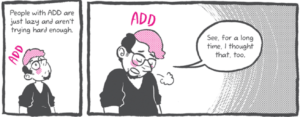
Source: Social Consciousness
“I think I do it to distract myself.”
I was telling a friend about my newly acquired habit of picking the split ends from my waist-length hair.
“From what?”
“Anger.” I thought about it. “I’m angry all the time.”
“With who?”
My eyes darted around the room. I was scared to admit it. “My boyfriend.”
I was so petty. The words came flooding back from my subconscious. How could I be so petty as to resent someone who never yelled at me or physically hurt me, who I loved and wanted more than anything to get along with?
But all the fights that seemed resolved every time he dropped me off at my apartment kept creeping back. Once I’d realize they weren’t resolved, I’d put on Friends reruns and pick at my hair to forget them, the red tips gathering on my white sheets.
It didn’t matter anyway. I was just overreacting. He was so loving and kind in so many ways. I couldn’t just let things go, could I?
I couldn’t. The memories would resurface days and weeks later.
There was the time I refused to lend him money because he hadn’t paid me back last time, and he sarcastically responded that if I want to treat our relationship like a set of transactions, then we’d might as well put everything on a spreadsheet and never get each other gifts.
Selfish. Greedy. Viewing relationships like transactions. That was me. So petty. Such an underserving girlfriend.
The truncated hairs fell one by one, severing the half of me still angry he never paid me back.
“Name one other time I’ve been unreliable,” he asked in order to make me justify my decision.
“You never read my thesis.” He’d said he would “later tonight” one day in January; it was March.
“Of course I’m going to read it. I just haven’t gotten around to it yet. It hurts that you don’t believe in me.”
I was hurting him. I didn’t believe in my own boyfriend.
Never mind the money. Never mind the thesis. What was wrong with me?
This was the guy who had surprised me by arriving at my apartment with newly bought ingredients and cooking me dinner. Who had patiently reassured me about all my body image concerns even though I must have sounded ridiculous.
But I was so mad.
Mad he wouldn’t pay me back the money he owed. Mad he didn’t keep his promises. Mad he turned this all around on me. Mad at him for making me mad at myself, and mad at myself for being mad at him.
I picked one hair after another, lost in the hypnotizing strands.
My brain was as split as the tips of my hair. I couldn’t tell which half of me was right.
While caught in this cacophony of conflicting thoughts, I went to a book fair with my boyfriend and a title caught my eye: The Verbally Abusive Relationship by Patricia Evans. This should be interesting, I thought. I’m interested in psychology. I stuffed it into my paper bag, all-you-can-fit for five dollars.
It was only during that fleeting moment between our kiss goodbye and my Friends reruns that I admitted to myself why I had really bought that book.
The next day, I opened it instead of my computer. As I half expected, I saw myself – both selves – scattered across the pages.
And in the midst of those pages, I learned that gaslighting – my partner’s technique of making me doubt my thoughts, feelings, and perceptions – was an abusive manipulation tactic. For the first time, I saw why his behavior stressed me out. And it wasn’t because I was a bad partner.
If you can identify any of these six patterns in your own relationship, you may not be a bad partner either. You may simply have been manipulated into believing you are one. If you find yourself in that position, I hope this list helps you the way The Verbally Abusive Relationship helped me: by providing an explanation for your distress other than your own inadequacy.
1. Conflicts Never Feel Resolved
If conflicts from days, weeks, or months ago still bother you even though you’ve discussed them with your partner, it’s possible they manipulated you into believing the discussion was over before it was.
My partner accomplished this manipulation by deflecting blame onto me.
Even if the action under discussion was his, I was just looking at it from the wrong angle. He’d tell me what the right angle was, and I’d feel guilty for not seeing things that way in the first place.
When our arguments were “resolved,” the resolution was usually that I had to work on myself because I was overreacting or my expectations were unreasonable.
Making someone feel oversensitive and unreasonable is gaslighting.
For example, one night, I was painting an instrument he’d built. After he told me what to paint and hovered over me complaining that I was doing it all wrong, I got mad and left the room. When he asked what was wrong, I yelled out of frustration, “You’re so clueless!” (Admittedly, I could have handled this better as well.)
He then gave me a talk about how I needed to stop calling him names like “clueless” to back him into a corner with no choice but apologizing. I panicked. Could I be the manipulative one? Would he break up with me?
I went to the bathroom, and when I got out, I was relieved to find him standing there holding his cat. We stood together and pet her like nothing had ever happened. Forget about my anger toward him. I was just relieved he wasn’t mad at me – so I dropped it.
Our fights went on like this for months, with me getting hurt and then repressing that hurt so he didn’t get mad at me.
As they started getting worse, a friend encouraged me to end the relationship. “But you fight with your boyfriend,” I pointed out.
“Our arguments end, though,” she said.
Finally, I saw why I could never get our arguments out of my mind: None of my concerns were ever addressed. They were simply deflected onto me.
I had stopped taking issue with his actions because I wasn’t allowed to, not because I felt better.
In a healthy relationship, your partner hears you out if you’re upset, and their goal is to avoid upsetting you in the future, not to debate whether you should have been upset in the first place.
2. When Your Partner Hurts You, You End Up Apologizing
Repeatedly gaslighted into believing my feelings were wrong, I grew remorseful for feeling them. Conversations would start with me believing he’d hurt me and end with me apologizing for getting hurt.
He’d convince me I was not only too hard on him, but also myopic. “Life is too short to get mad,” he’d say. “Can’t we just enjoy this nice day together?”
I’d tear up and think about how much I loved him and hated to taint our precious time together and thank him for reminding me what’s important in life and hug him and apologize for being so petty.
I’d go home on a high, feeling like I’d had a revelation about picking my battles, though the high would fade once I realized the conflict wasn’t resolved.
My concerns became results of my own pettiness. They didn’t matter – I was oversensitive, after all. I couldn’t be trusted.
Feeling like your feelings can’t be trusted to the point that you apologize for them is also a sign you’re being gaslighted.
3. You Don’t Feel You Deserve Your Partner
If someone makes you feel like the source of every conflict and convinces you that you’re shortsighted for getting upset, as my partner did by telling me it was unproductive to get angry and that it was my choice to be hurt by him, you may begin to feel like you don’t deserve them.
In fact, I wondered if I would drive all my future partners away for being so over-critical.
I grew to believe he was noble for resisting the urge to argue and I was small-minded in comparison. Thank God he was there to steer me back on track, I’d think. He understood what life was about.
Terrified I didn’t deserve him, I squashed my negative feelings to try to make myself more deserving.
This is what manipulative people want.
“It’s important to remember that you are not the problem; you’re simply being manipulated to feel bad about yourself, so that you’re more likely to surrender your power and rights,” psychologist Preston Ni writes in Psychology Today.
Since I was constantly trying to prove I was deserving, my partner always got what he wanted from me.
4. You’ve Done Things That Make You Uncomfortable to Avoid Conflict
Manipulation occurs when someone tries to force you out of your comfort zone. And I’m not talking about going on a spontaneous trip or trying a new food – I’m talking about disregarding your physical, emotional, or financial boundaries.
Manipulative people have sneaky ways of making their partners think their comfort zones don’t matter.
My partner’s chosen method was convincing me my comfort zone was unreasonable and that respecting it would mean disrespecting his.
The first boundary he coaxed me to cross was my standard for safer sex.
Since he’d had unprotected sex since he’d last gotten tested, I wanted him to get tested or use a condom before sleeping with me. He told me condoms hurt, so I asked him to get tested – for months.
He kept saying he would make appointments but never did. Eventually, he confessed that doctors’ offices made him anxious. He told me he’d only had unprotected sex one time since he was last tested and she said she was STI-negative, so it shouldn’t be an issue. I got sick of having the same discussion over and over, so I gave in and had unprotected sex.
My decision was not safe either, but it was understandable given the alternative. I didn’t want to dishonor his own feelings about condoms or doctors’ offices and put him out of his comfort zone.
The next boundary he wore away at was financial. Since I made more money than him, he argued, I should cover our dates when he was short on cash.
I had enough money to pay for his meals, so I again felt petty that it made me uncomfortable. Why was I putting my own ability to save money over his ability to enjoy our time together?
He also got me to cough up cash by telling me I was privileged and couldn’t understand what he was going through. I didn’t want to be unsympathetic, so I helped him out. I was afraid I’d be an inconsiderate, spoiled girlfriend if I didn’t.
As these stories show, his weapon of choice was not overt aggression, but intellectual, seemingly rational arguments. If I couldn’t justify my boundaries intellectually, I couldn’t have them.
That’s the ultimate manipulation – not violating the boundaries you’re defending, but convincing you to take them down on your own.
5. They Don’t Answer Your Questions Directly
My partner once taught me a trick for job interviews.
If someone stumps you with a question, he said, change the subject. Talk about how passionate you are about your work, how you always give it 100%, how you don’t like to say 110% because that’s an imaginary standard that doesn’t hold us accountable. By the time you’re done, the interviewer won’t remember what they asked you.
I soon realized he took this same approach to our conversations, which explained why so many of them left me wondering “Where did this all start?” only to realize they started with me unhappy.
When I’d try to tell him something was wrong in our relationship or even discuss a problem in my life that wasn’t about him, he’d bring up a tangentially related experience of his own or an abstract philosophical concept that had nothing to do with us. It was maddening.
Manipulative people do this so you can’t expose them.
Instead of confronting their mistakes, they divert your attention to something else, often with an emotional story that you’d feel bad interrupting. So, you comply with their subject change and try to forget how the conversation started in the first place.
Unfortunately, if it started with something important to you, it comes back to haunt you later.
6. You Feel Like Two Different People
One minute, I’d be complaining about my partner to my friends and family. The next, I’d be defending him against their claims that he wasn’t good for me. One minute, I’d vow to change my ways and hold him to lower expectations. The next, I’d be angry with him for not meeting the expectations I held.
I felt like I had split personalities, my allegiances constantly shifting. My thoughts were muddled and confused.
But after gaining an understanding of manipulation, I realized the version of me that was aligned with him was not based on my own original thoughts. He had manipulated me into advocating for him.
In fact, when I defended him, I sounded just like him. I ranted about how misunderstood he was. “Gas prices are ridiculous these days,” I’d point out when my friends found his habit of backing out of plans due to insufficient funds inconsiderate. “There was only one time he could have gotten anything,” I’d say to downplay the whole STI debacle. “I’m not perfect either,” I’d remind my friends, repeating something he liked to remind me.
I was in the middle of defending my boyfriend’s decision not to share any of the food in his house with me when my dad yelled, “Snap out of it!” Something clicked, and I realized I had been upset about all these things, too, before my partner convinced me they were no big deal.
Thankfully, I had family and friends who stood up for me – and stood up to me when I was gaslighting myself. Eventually, it became impossible to play the roles of both the loyal girlfriend and the friend and daughter of people who wanted the best for me. I had to pick one version of myself.
So I decided to speak up.
7. They Manipulate Your Beliefs About the Manipulation Itself
If you want to confront a manipulative person, Ni writes that they behave like bullies, so as you would stand up to a bully, “be sure to place yourself in a position where you can safely protect yourself, whether it’s standing tall on your own, having other people present to witness and support, or keeping a paper trail of the bully’s inappropriate behavior.”
But sometimes that doesn’t work. In my case, my partner used my “paper trail” as further evidence of my own pettiness.
That September, I pointed out that he still hadn’t read the thesis he promised to read in January. I didn’t even care about the thesis anymore, but I wanted him to understand why I had trouble putting faith in him rather than portraying my lack of trust as an attack.
“You didn’t have the right to yell at me for calling you out on not reading my thesis,” I said.
“Yes, I did.”
And that was about when I knew our relationship was headed downhill for good.
I was starting to see I didn’t deserve to feel like an ice queen for asking to split expenses or like I had to compromise my sexual boundaries to make him comfortable. And I knew that as long as I stayed with him, I would feel those pressures.
I dragged myself out of that relationship kicking and screaming, but I haven’t looked back since.
In her follow-up book The Verbally Abusive Man: Can He Change?, Evans writes that some verbally abusive people can change if they truly understand what they’re doing, which usually requires therapy, while others don’t recognize themselves as abusive.
When you confront a manipulative person, they will either take a good, hard look at themselves, or they will manipulate you into unseeing the manipulation.
That’s the final sign that you’re in a relationship with a manipulative person – and a loud and clear signal that they won’t change.
By the time of that conversation, I had already seen my partner’s manipulation too clearly for him to deny it, no matter how convincing his arguments were.
I hope that if you are being manipulated, what was previously fuzzy and confusing and so maddening you wanted to tear your hair out has come into focus for you as well.
Over two years since I ended that relationship, I’m still learning to view myself in a more positive light. I still gaslight myself all the time, but when I catch myself doing this, I try to remember my negative feelings are a sign something’s wrong, not a character flaw.
And I no longer pick my split ends.
[do_widget id=’text-101′]
Suzannah Weiss is a Contributing Writer for Everyday Feminism and a New York-based writer whose work has appeared in The Washington Post, Salon, Seventeen, Buzzfeed, The Huffington Post, Bustle, and more. She holds degrees in Gender and Sexuality Studies, Modern Culture and Media, and Cognitive Neuroscience from Brown University. You can follow her on Twitter @suzannahweiss.
Search our 3000+ articles!
Read our articles about:
Our online racial justice training
Used by hundreds of universities, non-profits, and businesses.
Click to learn more




















